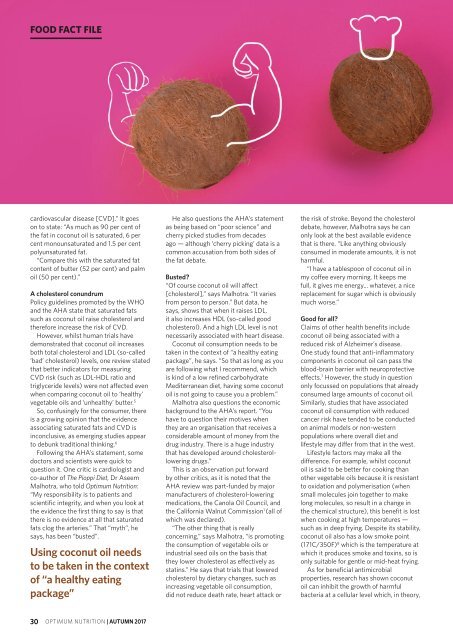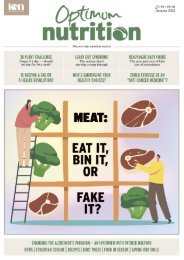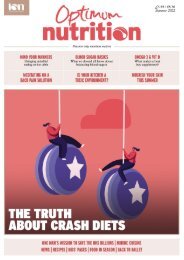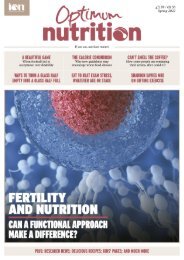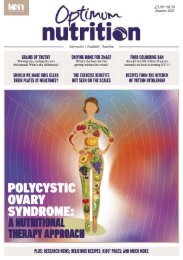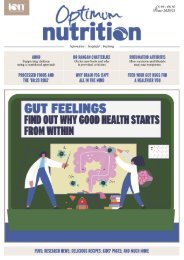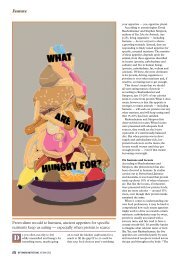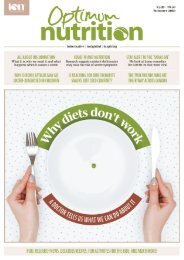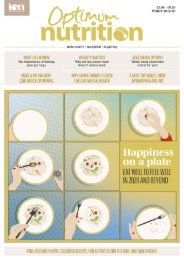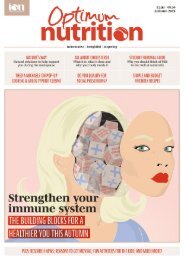You also want an ePaper? Increase the reach of your titles
YUMPU automatically turns print PDFs into web optimized ePapers that Google loves.
FOOD FACT FILE<br />
cardiovascular disease [CVD].” It goes<br />
on to state: “As much as 90 per cent of<br />
the fat in coconut oil is saturated, 6 per<br />
cent monounsaturated and 1.5 per cent<br />
polyunsaturated fat.<br />
“Compare this with the saturated fat<br />
content of butter (52 per cent) and palm<br />
oil (50 per cent).”<br />
A cholesterol conundrum<br />
Policy guidelines promoted by the WHO<br />
and the AHA state that saturated fats<br />
such as coconut oil raise cholesterol and<br />
theref<strong>or</strong>e increase the risk of CVD.<br />
However, whilst human trials have<br />
demonstrated that coconut oil increases<br />
both total cholesterol and LDL (so-called<br />
‘bad’ cholesterol) levels, one review stated<br />
that better indicat<strong>or</strong>s f<strong>or</strong> measuring<br />
CVD risk (such as LDL-HDL ratio and<br />
triglyceride levels) were not affected even<br />
when comparing coconut oil to ‘healthy’<br />
vegetable oils and ‘unhealthy’ butter. 5<br />
So, confusingly f<strong>or</strong> the consumer, there<br />
is a growing opinion that the evidence<br />
associating saturated fats and CVD is<br />
inconclusive, as emerging studies appear<br />
to debunk traditional thinking. 6<br />
Following the AHA’s statement, some<br />
doct<strong>or</strong>s and scientists were quick to<br />
question it. One critic is cardiologist and<br />
co-auth<strong>or</strong> of The Pioppi Diet, Dr Aseem<br />
Malhotra, who told Optimum Nutrition:<br />
“My responsibility is to patients and<br />
scientific integrity, and when you look at<br />
the evidence the first thing to say is that<br />
there is no evidence at all that saturated<br />
fats clog the arteries.” That “myth”, he<br />
says, has been “busted”.<br />
Using coconut oil needs<br />
to be taken in the context<br />
of “a healthy eating<br />
package”<br />
He also questions the AHA’s statement<br />
as being based on “po<strong>or</strong> science” and<br />
cherry picked studies from decades<br />
ago — although ‘cherry picking’ data is a<br />
common accusation from both sides of<br />
the fat debate.<br />
Busted?<br />
“Of course coconut oil will affect<br />
[cholesterol],” says Malhotra. “It varies<br />
from person to person.” But data, he<br />
says, shows that when it raises LDL,<br />
it also increases HDL (so-called good<br />
cholesterol). And a high LDL level is not<br />
necessarily associated with heart disease.<br />
<strong>Coconut</strong> oil consumption needs to be<br />
taken in the context of “a healthy eating<br />
package”, he says. “So that as long as you<br />
are following what I recommend, which<br />
is kind of a low refined carbohydrate<br />
Mediterranean diet, having some coconut<br />
oil is not going to cause you a problem.”<br />
Malhotra also questions the economic<br />
background to the AHA’s rep<strong>or</strong>t. “You<br />
have to question their motives when<br />
they are an <strong>or</strong>ganisation that receives a<br />
considerable amount of money from the<br />
drug industry. There is a huge industry<br />
that has developed around cholesterollowering<br />
drugs.”<br />
This is an observation put f<strong>or</strong>ward<br />
by other critics, as it is noted that the<br />
AHA review was part-funded by maj<strong>or</strong><br />
manufacturers of cholesterol-lowering<br />
medications, the Canola <strong>Oil</strong> Council, and<br />
the Calif<strong>or</strong>nia Walnut Commission 1 (all of<br />
which was declared).<br />
“The other thing that is really<br />
concerning,” says Malhotra, “is promoting<br />
the consumption of vegetable oils <strong>or</strong><br />
industrial seed oils on the basis that<br />
they lower cholesterol as effectively as<br />
statins.” He says that trials that lowered<br />
cholesterol by dietary changes, such as<br />
increasing vegetable oil consumption,<br />
did not reduce death rate, heart attack <strong>or</strong><br />
the risk of stroke. Beyond the cholesterol<br />
debate, however, Malhotra says he can<br />
only look at the best available evidence<br />
that is there. “Like anything obviously<br />
consumed in moderate amounts, it is not<br />
harmful.<br />
“I have a tablespoon of coconut oil in<br />
my coffee every m<strong>or</strong>ning. It keeps me<br />
full, it gives me energy... whatever, a nice<br />
replacement f<strong>or</strong> sugar which is obviously<br />
much w<strong>or</strong>se.”<br />
Good f<strong>or</strong> all?<br />
Claims of other health benefits include<br />
coconut oil being associated with a<br />
reduced risk of Alzheimer’s disease.<br />
One study found that anti-inflammat<strong>or</strong>y<br />
components in coconut oil can pass the<br />
blood-brain barrier with neuroprotective<br />
effects. 7 However, the study in question<br />
only focussed on populations that already<br />
consumed large amounts of coconut oil.<br />
Similarly, studies that have associated<br />
coconut oil consumption with reduced<br />
cancer risk have tended to be conducted<br />
on animal models <strong>or</strong> non-western<br />
populations where overall diet and<br />
lifestyle may differ from that in the west.<br />
Lifestyle fact<strong>or</strong>s may make all the<br />
difference. F<strong>or</strong> example, whilst coconut<br />
oil is said to be better f<strong>or</strong> cooking than<br />
other vegetable oils because it is resistant<br />
to oxidation and polymerisation (when<br />
small molecules join together to make<br />
long molecules, so result in a change in<br />
the chemical structure), this benefit is lost<br />
when cooking at high temperatures —<br />
such as in deep frying. Despite its stability,<br />
coconut oil also has a low smoke point<br />
(171C/350F) 8 which is the temperature at<br />
which it produces smoke and toxins, so is<br />
only suitable f<strong>or</strong> gentle <strong>or</strong> mid-heat frying.<br />
As f<strong>or</strong> beneficial antimicrobial<br />
properties, research has shown coconut<br />
oil can inhibit the growth of harmful<br />
bacteria at a cellular level which, in the<strong>or</strong>y,<br />
30 OPTIMUM NUTRITION | AUTUMN 2017


